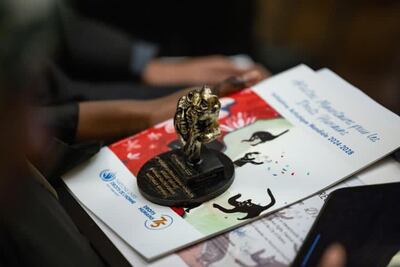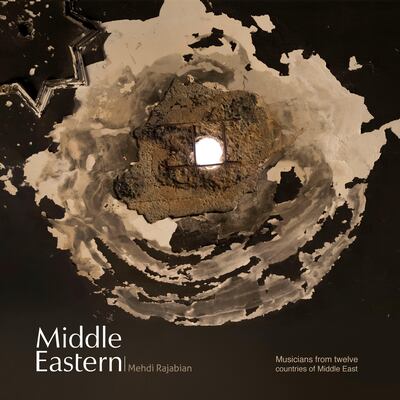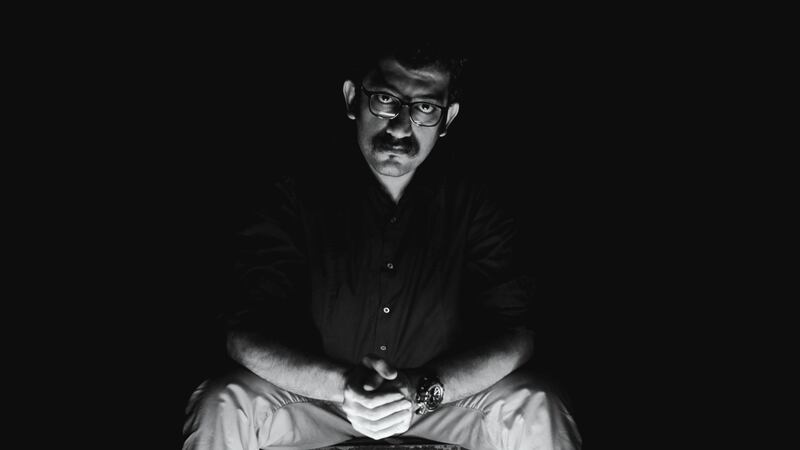After being announced as one of four winners in the second annual United Nations’ International Art Contest for Minority Artists last week, Iranian recording artist Mehdi Rajabian, who remains under a strict travel ban by the authorities, tells The National that he has grown accustomed to seeing his artistic achievements come to life in the virtual world.
Rajabian, who has been imprisoned twice for releasing music authorities labelled propaganda against the regime, says that the award will bolster his efforts to advocate for human rights in Iran.
"Silence in the face of any oppression is definitely co-operation with the oppressor, and perseverance, standing and independence should be our duty against cruelty, oppression and violation of human rights against any dictatorial system,” he said.
“By receiving this award, my artistic commitment and libertarian acts for music – as well as those that go beyond that for truth and human rights – have grown far more serious and solid as a result.”

Artists belonging to national, ethnic, religious and linguistic minorities were invited to submit up to five works of art related to themes of intersectionality and compounded forms of discrimination, said Laura Cahier, an equality and non-discrimination expert at the office of the United Nations High Commissioner for Human Rights.
“The award aims to support the work of minority artist human rights defenders, including by opening a global platform for greater visibility of their artwork and for dialogue on diverse human rights themes, through arts,” Cahier told The National.
Four winners were chosen by the judges panel this year, three adult laureates and one winner in the award’s youth category.
In addition to Rajabian, the three laureates included Babatunde Tribe from Lagos and Barcelona-born painter Bianca Batlle Nguema.
The award’s laureates each received $1,000 after having their work appraised by an independent judging panel composed of experts from different countries, disciplines and horizons, who were selected for their experience and commitment in the fields of arts.
“The judges were deeply struck and moved by the bravery, resilience and commitment of Mehdi Rajabian who, at the risk of his own life, has used his spirit and music to spread messages of hope, solidarity and resistance in Iran and the Middle East,” Cahier said.

Rajabian was detained and sentenced to prison various times between 2013 and 2020 in Iran, he told The National on Wednesday.
Arrested for the first time in October 2013 and detained in Evin prison in Tehran, Rajabian was put in solitary confinement for three months.
During his second detention at Evin prison, he undertook a 40-day hunger strike that caused him to lose 15 kilograms and 40 per cent of his vision, he said.
“Today, a dancer's dance cannot be enjoyed when a person is on the gallows for the death sentence and performs the last dance of his life. Today, we cannot expect to imagine a fictional horror novel when there is a real horror story of human rights violations in prisons,” Rajabian said.
Rajabian’s work continues to put him at risk of being detained, which, according to Cahier, was one of the reasons his work was highlighted by the award.
“Despite these hardships, Mehdi has continued to compose and record music as an act of resistance to be a human rights light in the dark. The judges were particularly moved by the fact that, from the basement of his own house, Mehdi has been building a community of artists from all over the world,” she said.
However, while the other winners were invited to spend a week in Geneva to participate in a programme of cultural and human rights-related activities, Rajabian attended the proceedings virtually, a communication medium that has defined much of his music career.
“It is sad that you never experience anything good and that your life events are always virtual. Of course, this is a virtual event from never performing a concert to not even having a CD of my album printed. All my artistic events and achievements are done only through virtual means, which means you don't touch anything real,” he said.
Rajabian’s work includes the unreleased album, History of Iran Narrated by Setar.
The setar, an Iranian lute, is Rajabian's main instrument.
In 2013, Iranian security forces shut down Rajabian's recording studio and confiscated a number of hard drives containing material he had recorded for the album.
Rajabian, his brother and the studio's manager were subsequently imprisoned.
They faced charges of producing and distributing unlicensed music and "spreading propaganda against the regime".
His next album, Middle Eastern, which received widespread acclaim, was a collaborative effort between Rajabian and 100 musicians from various parts of the Arab world.
The album was not released in Iran due to restrictions Rajabian is facing, however, it was released worldwide by Sony Music in 2019.







